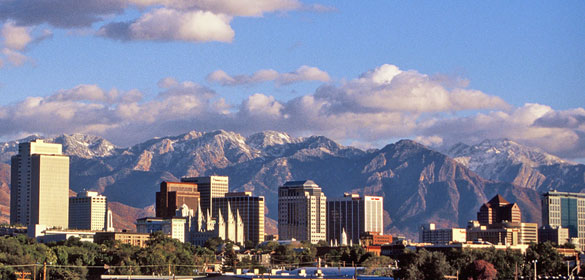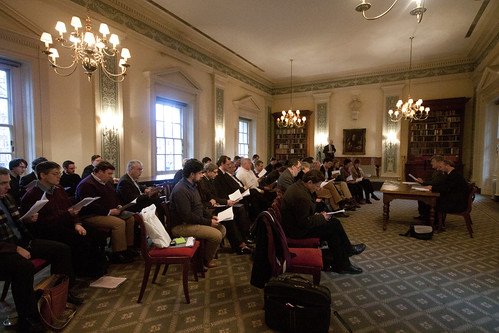 Sacred Music Colloquium XXII will be the most exciting and largest in history. It will be held at the remarkable Cathedral of the Madeleine in Salt Lake City, Utah
Sacred Music Colloquium XXII will be the most exciting and largest in history. It will be held at the remarkable Cathedral of the Madeleine in Salt Lake City, Utah
Dates: June 25-July 1, 2012.
This year we are expanding in new directions. You do not need to regard yourself as a singer or even a musician to attend. There are plenty of Gregorian choirs for first-time singers, and sessions are available for those who opt not to sing in a polyphonic choirs. There will be opportunities for both professional musicians and non-musicians who are just interested in the well-being of music at liturgy.
The venue of the Cathedral in Salt Lake is beautiful beyond description. Historically significant as well as aesthetically magnificent, the Cathedral of the Madeleine ranks among the finest locations ever made available for the Sacred Music Colloquium, which has grown in size in scope every year for six years.
The year 2012 promises to be the grandest ever with new opportunities for learning, singing, listening, and interacting with the best minds and musicians in the Catholic world today. The Cathedral Choir School has been wonderfully accommodating and opened up the full use of its facilities for the Colloquium.
You will have the opportunity to see how the Choir School functions, experience the amazing acoustic of the Cathedral, study under the best conductors and intellectuals in the entire Catholic music world, and form new friendships that you will value for years to come.
The primary focus of the Colloquium is instruction and experience in chant and the Catholic sacred music tradition, participation in chant choirs, daily and nightly lectures and performances and daily celebrations of liturgies in both English and Latin. You are there not merely as an attendee but as an integral part of the greatest music you will ever experience. It will will touch your heart and thrill your artistic imagination.
Attendance is open to anyone interested in improving the quality of music in Catholic worship. Professional musicians will appreciate the rigor, while enthusiastic volunteer singers and beginners new to the chant tradition will enjoy the opportunity to study under an expert faculty. Those who choose not to sing at all but merely want to learn will find a once-in-a-lifetime opportunity to absorb the full ethos of a world of the best liturgical music.
Do you want to make this trip your family vacation? There are so many things so see and do in the Salt Lake City area.
Once registered, there is no required sign up for individual choirs, scholas, or breakout sessions. Attend as suits your needs.
SOME COLLOQUIUM HIGHLIGHTS:
- Extensive training in Gregorian chant under a diverse and world-class faculty, with choices of a chant class for beginners, and intermediate and and advanced chant classes;
- Morning and afternoon sessions all week with lectures and workshops with the best of the best thinkers and doers in the world of Catholic music;
- Optional choral experience with one of four large choirs singing sacred music of the masters such as Palestrina, Vierne, Bruckner, Victoria, Byrd, Tallis, Josquin, and many others;
- Daily liturgies with careful attention to officially prescribed musical settings;
- Experience in singing or just listening to Mass settings, motets, chants, and responses;
- Residency in a full service hotel;
- Two gala dinners with top lecturers and events;
- Training in English chant from newly published works;
- Training in vocal production and technique;
- Conducting practicum;
- Training for Priests in the sung Mass;
- Pedagogy demonstrations;
- Composers’ Forum;
- Seminars on parish music management, integrating sung parts of the liturgy, polyphonic repertoire for beginning and more established choirs;
- All music, including prepared packets of chant and polyphony, as part of registration.
LOCATION
Salt Lake City is one of the most beautiful cities in the world, with some of the finest dining, mountainous views, and nicest people anywhere. Under the leadership of the Right Reverend Lawrence Scanlan (1843 – 1915), the first bishop of Salt Lake, the construction of The Cathedral of the Madeleine was begun in the year 1900 and completed in 1909. On August 15 of that year, the cathedral was dedicated by Cardinal James Gibbons of Baltimore. The architects were Carl M. Newhausen and Bernard O. Mecklenburg.The exterior of the cathedral remains substantially the same today as it was in 1909. The interior of the cathedral was largely created under the leadership of The Right Reverend Joseph S. Glass, who became Bishop of Salt Lake in 1915. A man of refined taste and strong artistic sensibility, Bishop Glass enlisted the aid of John Theodore Comes, one of the leading architects in America at the time, to undertake beautification of the original plain interior. The Comes interior, begun in 1917, was inspired in great part by the Spanish Gothic of the late Middle Ages. the colorful murals were added at that time, as was the dramatic polychrome evident throughout the building. The ornate reredos shrine of St. Mary Magdalen and the various shrines were notable features of the Comes renovation. Under the leadership of The Most Reverend William K. Weigand, who was appointed bishop of Salt Lake City in 1980, a much needed restoration of the interior, which had suffered the effects of dirt and pollution in the intervening decades, was planned and executed. The results are on full display today in breathtaking beauty.
FACULTY
- Mary Jane Ballou, Cantorae St. Augustine
- Wilko Brouwers, Monterverdi Choir, the Netherlands
- Dr. Horst Buchholz, St. Louis Cathedral
- Charles Cole, Westminster Cathedral; Brompton Oratory
- Charles Culbreth, Chant Cafe
- Rudy de Vos, Oakland Cathedral
- Aristotle Esguerra, Cantemusdomino.net
- Dr. Paul Ford, St. John Seminary; Camarillo, CA
- Gregory Glenn, Cathedral of the Madeleine
- David J. Hughes, St. Mary, Norwalk, CT
- Dr. Ann Labounsky, Duquesne University
- Dr. Mee Ae Nam, Eastern Michigan University
- Kathleen Pluth, St. Louis Church, Alexandria, VA
- Dr. William Mahrt, CMAA President, Stanford University
- Dr.Jason McFarland, Assistant Editor, ICEL
- Jeffrey Morse, St Stephen, the First Martyr Church, Sacramento, California
- Arlene Oost-Zinner, CMAA Programs Director; St. Cecilia Schola
- Jeffrey Ostrowski, Corpus Christi Watershed
- Sister Marie Agatha Ozah, Ph.D., Duquesne University
- Rev. Robert Pasley, CMAA Chaplain; Pastor, MaterEccelsiae, Berlin, NJ
- Dr. Kurt Poterack, Christendom College
- Jonathan Ryan, Organist; Jordan Prize Winner
- Dr. Edward Schaefer, University of Florida
- Dr. Susan Treacy, Ave Maria University
- Jeffrey Tucker, Chant Cafe, CMAA Director of Publications
- Msgr. Andrew Wadsworth, Executive Director, ICEL
- Dr. Paul Weber, Franciscan University of Steubenville
UNDERGRADUATE OR GRADUATE CREDIT OPTIONS
The Mary Pappert School of Music at Duquesne University will be extending the option of two hours of undergraduate or graduate credit to interested Colloquium participants. Dr. Ann Labounsky, chair of Sacred Music at Duquesne University and internationally known organist, will be your faculty adviser. Registration and payment information for undergraduate or graduate credit is provided by Duquesne Universtiy and payable to Duquesne University. Summer Course Registration Sheet 2012. If you are interested in obtaining two undergraduate credits, you must first file a formal application with Duquesne University. For more details about the application process, please contact Director of Music Admissions, Troy Centofanto, at musicadmissions@duq.edu Note that registering for credit at Duquesne is supplemental to registering for the program with the CMAA through the registration process outlined below. Any questions concerning Duquesne’s policies should be directed to Mr. Steve Groves at 1.412.396.6083 or groves108@duq.edu
REGISTER NOW



